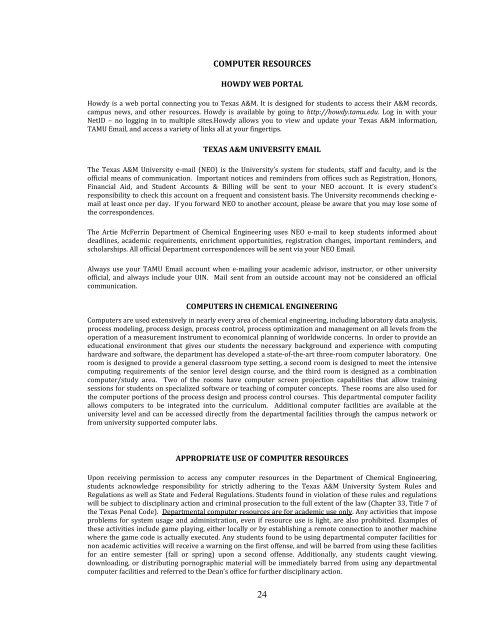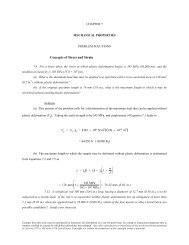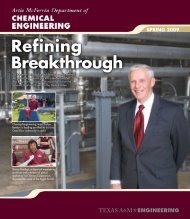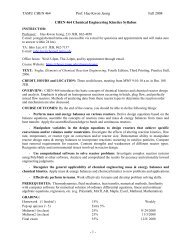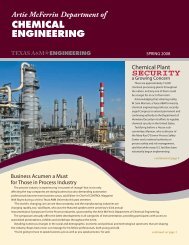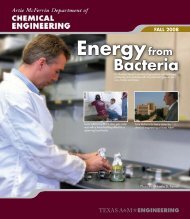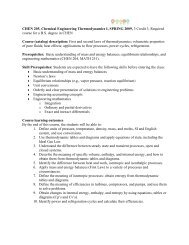Undergraduate Program Handbook - Department of Chemical ...
Undergraduate Program Handbook - Department of Chemical ...
Undergraduate Program Handbook - Department of Chemical ...
You also want an ePaper? Increase the reach of your titles
YUMPU automatically turns print PDFs into web optimized ePapers that Google loves.
COMPUTER RESOURCES<br />
HOWDY WEB PORTAL<br />
Howdy is a web portal connecting you to Texas A&M. It is designed for students to access their A&M records,<br />
campus news, and other resources. Howdy is available by going to http://howdy.tamu.edu. Log in with your<br />
NetID – no logging in to multiple sites.Howdy allows you to view and update your Texas A&M information,<br />
TAMU Email, and access a variety <strong>of</strong> links all at your fingertips.<br />
TEXAS A&M UNIVERSITY EMAIL<br />
The Texas A&M University e-mail (NEO) is the University’s system for students, staff and faculty, and is the<br />
<strong>of</strong>ficial means <strong>of</strong> communication. Important notices and reminders from <strong>of</strong>fices such as Registration, Honors,<br />
Financial Aid, and Student Accounts & Billing will be sent to your NEO account. It is every student’s<br />
responsibility to check this account on a frequent and consistent basis. The University recommends checking email<br />
at least once per day. If you forward NEO to another account, please be aware that you may lose some <strong>of</strong><br />
the correspondences.<br />
The Artie McFerrin <strong>Department</strong> <strong>of</strong> <strong>Chemical</strong> Engineering uses NEO e-mail to keep students informed about<br />
deadlines, academic requirements, enrichment opportunities, registration changes, important reminders, and<br />
scholarships. All <strong>of</strong>ficial <strong>Department</strong> correspondences will be sent via your NEO Email.<br />
Always use your TAMU Email account when e-mailing your academic advisor, instructor, or other university<br />
<strong>of</strong>ficial, and always include your UIN. Mail sent from an outside account may not be considered an <strong>of</strong>ficial<br />
communication.<br />
COMPUTERS IN CHEMICAL ENGINEERING<br />
Computers are used extensively in nearly every area <strong>of</strong> chemical engineering, including laboratory data analysis,<br />
process modeling, process design, process control, process optimization and management on all levels from the<br />
operation <strong>of</strong> a measurement instrument to economical planning <strong>of</strong> worldwide concerns. In order to provide an<br />
educational environment that gives our students the necessary background and experience with computing<br />
hardware and s<strong>of</strong>tware, the department has developed a state-<strong>of</strong>-the-art three-room computer laboratory. One<br />
room is designed to provide a general classroom type setting, a second room is designed to meet the intensive<br />
computing requirements <strong>of</strong> the senior level design course, and the third room is designed as a combination<br />
computer/study area. Two <strong>of</strong> the rooms have computer screen projection capabilities that allow training<br />
sessions for students on specialized s<strong>of</strong>tware or teaching <strong>of</strong> computer concepts. These rooms are also used for<br />
the computer portions <strong>of</strong> the process design and process control courses. This departmental computer facility<br />
allows computers to be integrated into the curriculum. Additional computer facilities are available at the<br />
university level and can be accessed directly from the departmental facilities through the campus network or<br />
from university supported computer labs.<br />
APPROPRIATE USE OF COMPUTER RESOURCES<br />
Upon receiving permission to access any computer resources in the <strong>Department</strong> <strong>of</strong> <strong>Chemical</strong> Engineering,<br />
students acknowledge responsibility for strictly adhering to the Texas A&M University System Rules and<br />
Regulations as well as State and Federal Regulations. Students found in violation <strong>of</strong> these rules and regulations<br />
will be subject to disciplinary action and criminal prosecution to the full extent <strong>of</strong> the law (Chapter 33, Title 7 <strong>of</strong><br />
the Texas Penal Code). <strong>Department</strong>al computer resources are for academic use only. Any activities that impose<br />
problems for system usage and administration, even if resource use is light, are also prohibited. Examples <strong>of</strong><br />
these activities include game playing, either locally or by establishing a remote connection to another machine<br />
where the game code is actually executed. Any students found to be using departmental computer facilities for<br />
non academic activities will receive a warning on the first <strong>of</strong>fense, and will be barred from using these facilities<br />
for an entire semester (fall or spring) upon a second <strong>of</strong>fense. Additionally, any students caught viewing,<br />
downloading, or distributing pornographic material will be immediately barred from using any departmental<br />
computer facilities and referred to the Dean’s <strong>of</strong>fice for further disciplinary action.<br />
24


